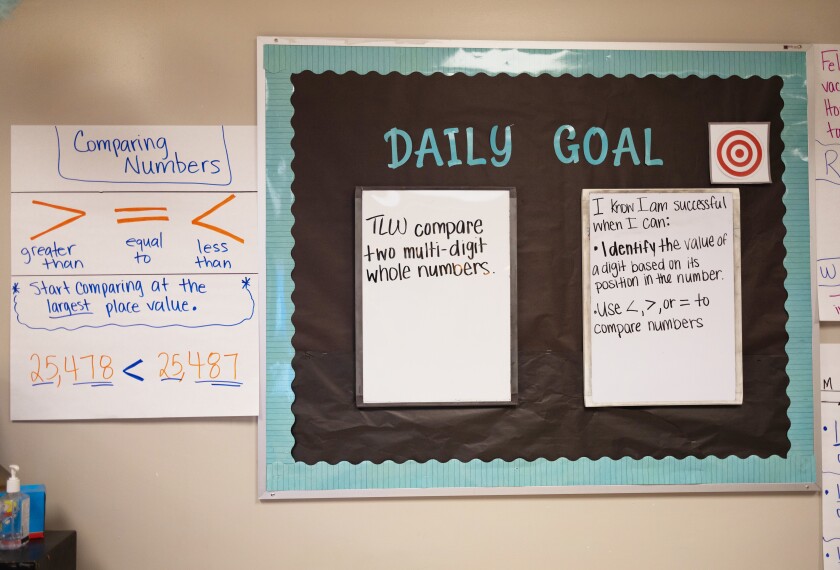Toward the end of last school year, I sat on a virtual mathematics panel discussing the resilience of students in the face of COVID-19’s traumatic educational consequences. I began to examine the social-emotional implications of the pandemic in a field I have been teaching in for over 20 years: mathematics.
The pandemic exacerbated the inequities of educational resources, leaving many students, especially those from high-needs districts, behind mathematically. These widening disparities are particularly damaging for students already at risk for “checking out” of math because of hostile classroom experiences.
Whenever I inform people of my occupation, they are animated with a look of joy or misery as they remember their feelings for math—and it’s usually the latter. They often regale me with stories of negative classroom experiences or encounters, usually involving a teacher embarrassing or ridiculing them in class.
“I writhed like a snake over coals if it came near me,” writes poet Chase Twichell in the poem about “Math Trauma.” This sentiment is echoed in many of the anecdotal stories about people’s math experiences.
One person vividly remembered trying to gain clarity on a math concept and the teacher replying, in front of the class, “That was a dumb question.” They never asked a question in a math class again. For many, that one experience became so traumatic that it led them to ignore math and any of its adjacent fields of study.
For me, math trauma is an event (or a sequence of events) where an educator or another person of authority chooses to embarrass, scorn, or deride students for their mistakes rather than celebrate their courage. That math trauma is then triggered whenever they encounter a math problem or math conversation for the duration of their academic years. Even outside of school, they refuse to recognize daily habits such as balancing a checkbook, counting money, or estimating prices as practicing math.
As an undergraduate, an academic adviser told me that I would never complete a math degree, let alone get a Ph.D. in anything. That, for me, was a traumatic moment. It was commonplace for people to underestimate my abilities based on my race, gender, and public school background.
Instead of letting those negative comments and assumptions dominate and traumatize me, they became my motivation and launching pad for success. I always remembered the teachers I had in middle and high school who reinforced courage, leadership, and discipline.
As a first-generation college student, I took inspiration from the television show “A Different World” as a positive image of a Black college experience. In one episode, a professor made her class stand up and recite the chant, “You are a voice in this world and you deserve to be heard.” As I faced discrimination in math, this mantra continued to resonate with me. I also had a community of family, friends, and mentors that helped me counter those negative stereotypes and prevent math trauma from taking root.
However, many students who don’t receive such encouragement and support end up reacting to negative experiences in the classroom by concluding, “This math stuff isn’t for me.”
Math trauma may be amplified for underrepresented groups in math. As a field historically dominated by white men, mathematics is rife with norms that have excluded women and students of color. Stereotype threat and teachers’ preconceived notions of students’ math abilities can further hinder minoritized groups. If we want to diversify the math arena, alleviating math trauma and encouraging math curiosity from all races and gender is necessary.
Why focus on this issue now? As educators recovering from the pandemic, we are channeling our creativity, innovation, and imagination through our pedagogy and curriculum. Let us extend this same gift to our students, especially in math. Now is our chance to reset, recalibrate, and create new norms in countering the previous standards that have been a disservice to our students.
We must eliminate bias and assumptions about our students and permit time for them to process, develop, and construct math abilities, comprehension, and reasoning. As we plan novel ways to teach in this new normal, let us move forward with a renewed zeal to leave outdated standards in the past.
For educators, especially those teaching students of color, I caution you to be careful on the assumptions, biases, and predispositions you bring to the classroom. Focus on supporting and encouraging young minds in math class and appreciating their ingenuity.
My teaching goal is to convey a culture of acceptance and appreciation of differentiated math abilities. At the beginning of each semester, I introduce my students to psychologist Carol Dweck’s concept of fixed mindsets vs. growth mindsets. We focus on why it’s important to understand how the brain grows and how learning is malleable and not static. However, I wonder if we educators have more of a fixed perspective when it comes to believing in our students.
For the past 12 years, I have attended an improvisation class, where I learned a valuable technique that I now incorporate into my math instruction: the “Yes, and...” principle. With this approach of accepting and expanding on whatever was just said, no question is ever unimportant. With each question that a student asks, we can recalibrate. This creates a teachable moment and the chance to revise my strategy to help students find the correct answer. Many times, I encourage students to explain their reasoning of a problem without providing a final answer. This encourages students to see themselves as math thinkers.
Let us not be the reason students feel deterred or traumatized from pursuing math or another STEM subject. We must encourage and acknowledge our students’ strengths whenever we can. We can also provide all our students with the necessary tools to become effective and proficient in math. Once we institutionalize these strategies in our classrooms, then perhaps the next time you tell someone you teach math, you’ll get a smile of delight.




